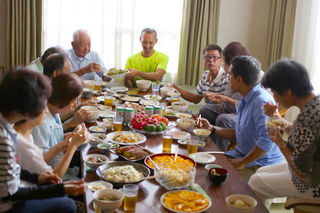Stress
Sanjay Gupta on Managing Stress and Work-Life Balance
Other cultures can teach us a lot about enhancing our health and happiness.
Posted April 18, 2019
What can we learn from other cultures about coping with stress and balancing work and life?
Dr. Sanjay Gupta traveled the world in search of the answers to these and other questions, which he chronicled in the new CNN series Chasing Life. Gupta discovered that there is much we can learn about health and happiness by looking at what people in other cultures are doing—and we can potentially use that information to enhance our own health.
I recently sat down with Gupta to discuss the key things he learned on his travels. You can read Part 1 of our interview here, which focuses on the secrets to leading happier and healthier lives. In this post, I present the second half of our discussion, which focuses on differences in how other cultures manage stress, think about family, and deal with work-life balance. A lightly edited transcript of our conversation appears below.

Justin Lehmiller: Let’s talk about stress, because stress affects both our physical and mental health. Based on what you've learned in your travels around the world, are there any takeaways for how we can better manage stress and reduce the negative effects it has on our health and happiness?
Sanjay Gupta: Let me answer this first from a societal level and then from an individual level. From a societal level, one thing that jumped out at us is this notion of what we call “dashed expectations.” Why does a society get stressed? Why do groups of people become stressed? There are all sorts of different reasons for that, but as you start to really dig down, you find the basic notion that it is far worse to have expected and not received than to have simply not received.
When a society has progressed at a certain pace for a long period of time and then suddenly seems to stop progressing at that pace—even if it's still progressing and even if it's still a wonderful society in which to live—it can be very stressful because you’ve come to expect a certain level of progress. Japan is a good example of this. After World War II, from that time period through the '70s, Japan built the miracle economy. Second largest economy in the world, explosive growth. They were building a new skyscraper every week in Tokyo, it seemed, for a period of time. And then the next generation was expected to do even better than that; however, the world changed. They couldn’t do better than that because it was just a different world. The expectations were so high, and when they became dashed, it led to awful amounts of stress. Japan is one of the most stressed countries in the world, leaving aside Okinawa, which is its own island nation almost outside of Japan.
It's an important lesson, I think, that the notion of dashed expectations can be very stressful to a society. Another thing we found was that inequality—glaring inequality—is not good for a society, no matter where on the spectrum you are. If you're someone who is on the more privileged side of the spectrum, or the more disenfranchised part of the spectrum, it doesn't matter. Glaring inequality leads to a sense of being unsettled, instability within a society, and a lot of stress. This is not to suggest that certain types of government are necessarily better than others, but just that when inequality is particularly high and obvious, it can be very stressful for a society.
From an individual standpoint, if you understand those two broader contexts, I think it influences how you live your life. For example, for me, I have three kids that are getting to be teenagers and I'm very careful in how I think about the expectations I place on them. I'm very careful with my language and the things I say, being very mindful that the world is constantly changing. I can't ask of them things that were based on the world that I grew up in, or the world that existed when I was their age. It changes so rapidly, and I think it's good for me to be mindful of that and it’s probably a lot less stressful for them when I think about things that way.
Justin Lehmiller: Something related to stress that I’d like to address is work-life balance. Many Americans feel out of whack in this area, and in the international travels I’ve done, it seems that we’re especially likely to sacrifice life and focus more on work. Do you have any advice in terms of getting better work-life balance?
Sanjay Gupta: I don't know that I can point to a country and say that they've got it figured out. I think the surprising thing to me, and something that I took away for myself is this: I go off to shoot these shows. I’m on the road for two weeks and I miss my kids—but I'm thinking what I'm doing is very important. So how do I strike that work-life balance myself? I think the idea of work-life balance almost suggests that the two are mutually exclusive—you have to find time for this, you have to find time for that. I think if there's anything that I've learned and taken away from some of the people that I've met around the world is that, maybe that's not the right way to think about it.
Looking at your work as this necessary evil in order to pay bills, to have a life, to provide for your family—maybe that's not the right way to think about it. Instead, when I come back from my trips, I very much share my experiences with my family. Even at the planning stages of these trips, I spend a lot of time talking to my kids about things they find interesting. Breaking down the wall between work and life, I think, seems to work best.
I balance my family life into my work, and I let my work into my family life, and I make that a porous border. It seems to really be beneficial, as opposed to trying to set aside a certain number of hours for work and then a certain number of hours for life.
Justin Lehmiller: Did you discover any differences in the way that people think about family, or the value or emphasis that they placed on family? How might that shape the health and well-being of people in a given culture?
Sanjay Gupta: In the United States, if you get to be in your mid-60s or so and you retire, you sort of feel like you've been discarded from your professional life. If you don't have close family ties, you may feel like you're being discarded from your personal life to some extent as well. By contrast, older people in Japan are respected. Their opinions and their guidance are solicited. There are multi-generational families there, living in the same household. All of that seems to make a difference in terms of their own happiness, their own socialization, and I think that’s part of the reason why people live as long as they do.

When you start to lose your sense of value within the family structure, which sadly happens too much in places like the United States, that could be part of the reason people aren't living as long. If you can somehow increase that value, even from a personal level if not from a professional level, that seems to make a big difference. I would say that's the case in most countries around the world, and that when you come back to the United States, it feels a little bit like the exception in this regard.
Justin Lehmiller: Last question—would you take the view that adopting a more cross-cultural perspective could enhance medical and psychological training in the United States? In what ways would taking this cross-cultural view potentially benefit the way we train future healthcare providers? Could it also help in terms of reducing our healthcare costs?
Sanjay Gupta: We live in this environment where we’re spending the most per capita of any healthcare system in the world, and we're not getting in return what people think we should. Yet there are these extraordinary things happening around the world that we can verify—things that have legitimate science behind them, that have been preserved for thousands of years. To the extent that we can take a cross-cultural view of healthcare, there's a lot to be learned.
When I come back and talk to my colleagues in the academic medical world, there is a huge appetite for this, even among the highly specialized fields. I love being a doctor, and I love practicing in the United States, but I'm very cognizant of the fact that we can be very provincial in this country, thinking that unless it's “made in America,” it doesn’t have the same value. I think that this show will be a good example of the fact that there are tremendous things to be learned from other places in the world, and some of these things should be taught.
I think that, oftentimes, we're developing medical technologies in the United States in search of a problem to solve. The technology is outpacing the problem. Maybe we should look at the problems first, and then look to simple solutions, some of which come from the earth, that are natural—foods that stimulate longevity genes, organisms that buffer our immune system, the notion of food as medicine, whatever it might be. When you do this, you find that there can be an incredible payoff for relatively simple interventions that not only make you healthy but make you happy as well.
For more highlights from my conversation with Dr. Sanjay Gupta, see here. Check out his new CNN series Chasing Life.
LinkedIn Image Credit: ARTFULLY PHOTOGRAPHER/Shutterstock




